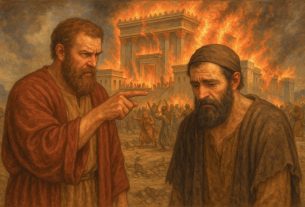Abraham Joshua Heschel published The Earth Is the Lord’s in 1949. In his preface, he writes that, “The story about the life of the Jews in Eastern Europe which has come to an end in our days is what I have tried to tell in this essay.” This book is a heartbreaking elegy, a written memorial to a religious world destroyed by the Holocaust. In it, Heschel depicts the inner life of the Eastern European Jew, constantly filled with the rhythms of Judaism. There, the most ordinary of Jews lived a profoundly religious life; Heschel points out that even the wood choppers of Berdichev had their own daily society to study the Mishnah.
Heschel laments at the end of the book: “A world has vanished.”
We feel that loss most profoundly right now, during the month of Elul. Yes, like our forebears, we also say Selichot and sound the shofar. But for us, Elul is rather banal. It overlaps with the end of summer vacation and the beginning of back to school; quotidian concerns dominate instead.
But in the world that vanished, Elul was very different. The old Yiddish saying was, “In the month of Elul, even the fish in the water tremble.” This encapsulates the intensity of a month like no other. Elul is the last exit before the Days of Awe. Rabbi Reuven Bengis related that when the chazan blessed the new month and pronounced the word “Elul,” people would burst into tears; some even fainted.
There was a sense of urgency in the old world Elul; one must get ready for Rosh Hashanah. In the 14th century, the Maharil recommends that “throughout all the days of Elul every individual should sit down before his meals and before going to sleep, and reflect with trembling upon himself, examining his misdeeds, so that he may confess them during the Days of Repentance that are approaching him.”
Everyone felt this urgency. Rabbi Yisroel Salanter would recount that when he was a small child playing outside in the sand, his sister called out to him and said, “Why are you playing? It is the month of Elul!”
The 40 days from Rosh Chodesh Elul until Yom Kippur stand alone in the Jewish calendar; during this time, one is standing directly in the presence of the King.
They are the peak spiritual moments of the year.
Peak moments appear throughout the Jewish calendar. They are cathedrals in time, meant to transport us to an island of transcendence. And no peak moment rises higher than the 40 days between the beginning of Elul and Yom Kippur.
And while there are places where the Elul of the old world remains, it often feels somewhat hollow, like actors trying to revive an old play about long-lost characters.
Elul is no longer the peak moment it once was.
This may just be our fate, the result of living in the contemporary West. Charles Taylor writes about the development of modern identity into the “buffered self.” It insists on maintaining full control internally by shutting out any outside rumors of the transcendent. This is why the tears of Elul dried up long ago; now, every person stands at the center of their own universe, safe from any cosmic influence.
But all is not lost. We too can get a taste of Elul. Rabbi Yisroel Salanter famously declared that “the entire year should be like Elul.” One can reach transcendence even without the tears, trembling and drama of the High Holiday season.
It can be Elul anytime.
Even off-peak moments offer infinite spiritual opportunities. The Talmud reports some rabbis dissented from the traditional view that Rosh Hashanah is the day of judgment. “Rabbi Yose says: A person is judged every day… Rabbi Natan says: A person is judged every hour…” If so, every day is one of the Days of Awe.
Rabbi Joseph Soloveitchik reports that, in contrast with so many others, his father avoided the emotional drama of the high holidays. He writes, “Once…before the sounding of the shofar…the shofar sounder, a God-fearing Chabad Hasid…began to weep. My father turned to him and said: “Do you weep when you take the lulav? Why then do you weep when you sound the shofar? Are not both the commandments of God?” As Rabbi Soloveitchik explains, the Hasid wept because in Kabbalah, the shofar reflects the tragic distance between man and God. His father, however, rejected this; to him, a mitzvah was a mitzvah, each worthy of simple devotion.
Off-peak moments may even take priority. In 15th-century Egypt, someone asked Rabbi David ibn Avi Zimra (Radvaz) about a person who had been imprisoned. The local governor would let the man leave once to go to the synagogue, on a day of the prisoner’s choosing. They asked the Radvaz to determine which day the prisoner should elect to leave; was it Yom Kippur, Purim, or some other holiday?
The Radvaz’s answer was simple: the man should go to the synagogue the very next day. We don’t skip an opportunity to do a mitzvah. Each “ordinary” day is actually a high holiday of its own.
Existential philosophers talk about seizing each moment, of not letting time simply slip by thoughtlessly. And that is the point the Radvaz is making as well; we do not pass over mitzvot. For us, today’s mitzvah is the most important mitzvah.
One can break through the everyday to get a glimpse of eternity. And it doesn’t take much to do so; we simply have to make sure that time doesn’t slip through our hands. When we stop to do one simple mitzvah, we can experience a taste of Elul.
When I meet with couples about to be married, I repeat the old saying that “most people spend more time planning their wedding than they do planning their marriage.” I understand why the wedding is a big deal; it is the ultimate peak moment, when their lives change forever. But the true beauty of a marriage is found in everyday acts of love, like when you run to the drugstore in the middle of the night to get your spouse some medication. You might be disheveled, wearing a winter coat over pajamas. But this is what love looks like; and when preparing for a life together, couples should spend their time getting ready for that visit to the pharmacy.
In a good marriage, it is a wedding every day, with two spouses who always strive to do the right thing.
So it is with Elul. Maybe we just can’t experience the awe-inspiring Elul of old. But we can get some of the small things right.
There is a beautiful story told about Rabbi Levi Yitzchak of Berditchev:
Rabbi Levi’s neighbor was a shoemaker. One night, Rabbi Levi heard his neighbor working past midnight. Surprised, he knocked on his door and asked: “Aren’t you tired? It’s going to be morning soon.”
The shoemaker pointed to his candle and explained: “As long as the candle burns, there is still more time to mend.”
Rabbi Levi Yitzhak began to weep. “How truly you teach, my master,” he said to the shoemaker. “As long as the candle of our soul remains alight with life, there is still time for each of us to mend ourselves, and the world…”
Peak moments give life incredible meaning; but we all too often overlook the power of everyday moments. We must never forget that as long as the candle burns, even the little things make a difference.
Have a meaningful Elul. But remember, even if Elul ends up being spiritually disappointing, there is always a chance to mend things; there is always an Elul, anytime.
Rabbi Chaim Steinmetz is the Senior Rabbi of Congregation Kehilath Jeshurun in New York.




